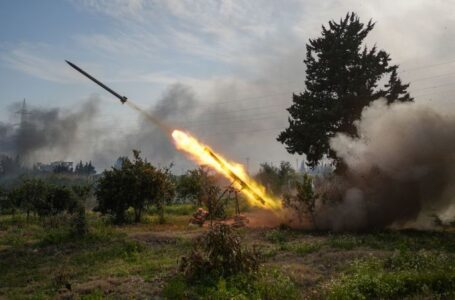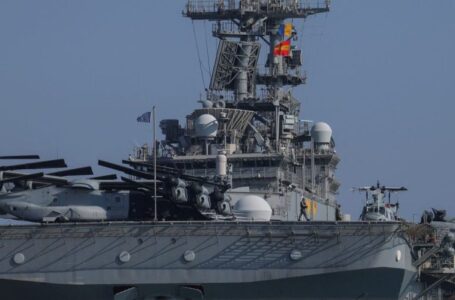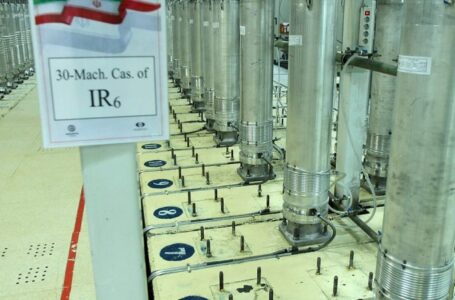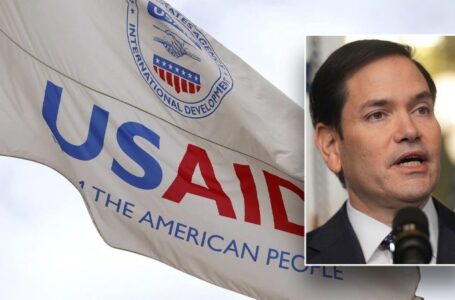What the Syrian rebellion could mean for the balance of power in the Middle East
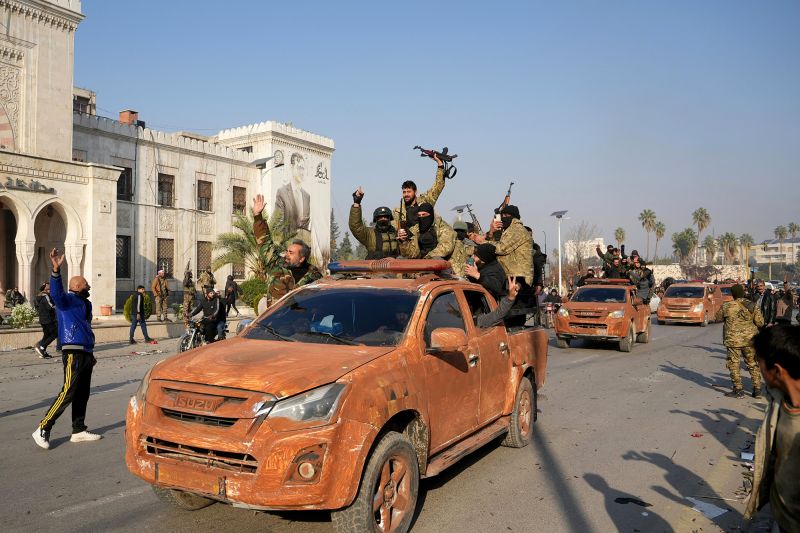

Global stakeholders now have to reckon with the geopolitical impact of a rebel offensive led by an Islamist group in Syria that could potentially threaten President Bashar al-Assad’s hold over the country.
Syrian rebels have made a lightning advance in the north of the country, taking two major cities: Aleppo, the second biggest city, and Hama, a strategically important city that lies on a vital supply route. The rebels are saying they’ll advance further south to Homs, just over 100 miles from the Syrian capital of Damascus.
While Assad has many enemies in the region and beyond, his fall wouldn’t be welcomed by all.
Western and Arab states, as well as Israel, would like to see Iran’s influence in Syria curtailed, but none wish for a radical Islamist regime to replace Assad. For Russia, Syria’s fall could mean losing its closest Middle Eastern ally and undermining its ability to project power while it fights a war in Ukraine. For Iran, it could shatter its so-called Axis of Resistance, comprising allied states and militias.
Here’s how the events in Syria could impact key players in the Middle East:
Arab states
The rebel advances in Syria mark the first real test of powerful Arab states’ commitment to reconcile with Assad.
At the height of the Syrian civil war, Sunni Arab states, including regional powerhouses Saudi Arabia and the United Arab Emirates, broke ties with the Iran-allied Assad regime, moved to isolate it and threw their weight behind opposition groups trying to topple it, seeing it as an opportunity to curb Tehran’s regional influence.
But Assad, aided by Russia, Iran and Lebanon’s Hezbollah, survived and reclaimed territory lost to the rebels. Under heavy US sanctions, Syria turned into what some experts have called a “narco-state,” fueling a drug crisis in neighboring countries.
Syria’s new reality prompted Arab nations to extend a hand to the Assad regime, and over the past few years, Saudi Arabia and the UAE have led efforts toward his regional and international rehabilitation. In 2023, the Syrian regime was readmitted to the Arab League.
Over a decade after they backed the Syrian opposition, Gulf Arab states, including Saudi Arabia and the UAE, are now siding with Assad as he once again faces a rebellion.
“In 2011, a very large number of countries rather quickly came to the view that they would be better off if Assad fell and they wanted to get rid of him… but the Saudis, Emiratis and others in the region see this now as a challenging and destabilizing situation for them if Assad falls at this point,” said Trita Parsi, executive vice president of the Washington DC-based Quincy Institute.
In their annual Gulf Cooperation Council (GCC) summit last weekend, Gulf Arab leaders called for the preservation of Syria’s territorial integrity, declared respect for its sovereignty and rejected regional interference in its internal affairs. By contrast, the statement after the 2011 GCC summit called on Assad to “immediately stop the killing machine, put an end to the bloodshed and release detainees.”
“We might see that many of these countries would want to take advantage of the situation to improve their own position inside Syria, particularly with Iran, but that necessitates that Assad is weakened but stays – a very different position from what they had earlier on when they were throwing everything at him to get rid of him all together,” Parsi said.
Iran
Iran has used Syria to expand its regional influence through proxy groups stationed in the country. The Islamic Republic, along with its most formidable proxy Hezbollah, have proven instrumental in keeping Assad in power, by helping Syrian government forces regain lost territory, while sending its own Islamic Revolutionary Guard Corps (IRGC) commanders to advise Assad’s military.
After the Palestinian militant group Hamas launched its attack on Israel in October last year, Hezbollah began exchanging fire with Israel, prompting an Israeli retaliation that had the group’s top brass assassinated and significantly debilitated its capabilities. As a result, Hezbollah pulled its forces out of Syria to focus on its war with Israel, leaving Assad exposed, experts said.
In Syria, Israel has consistently targeted Iranian personnel and supply routes used to transfer weapons to its proxies. The fall of Aleppo and potentially other cities bordering Lebanon could further disrupt those routes, placing Iran in a difficult position. Last week, Iranian Foreign Minister Abbas Araghchi told the Qatari news outlet Al Araby Al Jadeed that Tehran would consider sending troops to Syria if requested by the Assad regime. However, escalating the war in Syria could undermine Iran’s efforts to pursue diplomacy with the West and Arab states.
Losing Syria would be “a huge blow” for Iran, Parsi said. “The investment Iranians have made in Syria is very significant, it’s an important land bridge to Lebanon, but also the alliance the Iranians have with the Assad regime has lasted across the Islamic Republic’s history.”
Iran may also use its proxies in the region as leverage in potential talks with an incoming Trump administration, Parsi said.
“If Iran loses too much of their position in the region, will they be too weak to negotiate? But if they fight back to try and retain as much of that position as possible, do they risk escalating the war to the point where diplomacy may no longer be possible?” he said. “They’re walking a fine balance,”
Israel
Israel too is caught in a difficult position. Assad, who views Israel as an enemy, has not posed a direct threat to the country, opting not to respond to the regular Israeli strikes in Syria over the past year. But the regime has allowed its territory to be used by Iran to supply Hezbollah in Lebanon.
Hadi al-Bahra, a Syrian opposition leader representing anti-Assad groups, including the Turkey-backed Syrian National Army (SNA), said rebels felt encouraged to make an advance for Aleppo last week after Israel debilitated Hezbollah and weakened Iran’s footprint in the region.
“Due to the Lebanese war and decrease in Hezbollah forces, (Assad’s) regime has less support,” Al Bahra told Reuters in an interview, adding that Iran-backed militias also have fewer resources, and Russia is providing less air cover to Assad’s forces due to its “Ukraine problem”.
The group leading the rebellion, however, is Hayat Tahrir Al Sham (HTS) whose leader Abu Muhammad Al Jolani is a former al Qaeda fighter with an Islamist ideology that opposes Israel.
Israel has to make sure that the offensive will not evolve into a “new challenge” posed by HTS and the Sunni rebels leading the offensive in Syria, he added.
Russia
Assad was on a losing streak in Syria until Russian President Vladimir Putin intervened in 2015. Without Russian air support, the recapture of Aleppo in 2016, a turning point for the embattled Syrian president, would have been difficult, if not impossible.
The Kremlin said this week it will “certainly continue to support” Assad as Russian jets stepped up strikes on opposition forces in northern Syria.
Nicole Grajewski, a fellow in the Nuclear Policy Program at the Carnegie Endowment for International Peace with a focus on Russia, said the Assad regime was caught off-guard during the rebels’ latest offensive, and the rebels may have taken advantage of Russia’s distraction with Ukraine to take land in Syria.
Moscow hadn’t committed a large number of forces to Syria and may still be capable of supporting it, she added, but Russia’s ability to mobilize forces would be difficult given how quickly the rebels are advancing across northern Syria.
Turkey
Turkey has tried to distance itself from the rebels’ actions in northern Syria, but it is the primary backer of the Syrian National Army, one of the groups pushing the offensive.
Ankara has also represented the opposition in negotiations with Russia over several years in the past decade, which eventually led to a ceasefire agreement in 2020 between parties in Syria each of them supports.
Despite its support for opposition forces, Turkey has not ruled out a rapprochement with Syria. President Recep Tayyip Erdogan has called for a meeting with Assad, the man he once labeled a terrorist, to reset relations. Assad has refused to meet him as long as Turkey continues to occupy parts of his country.
Turkey has also sought a solution for an estimated 3.1 million Syrian refugees it hosts – more than any other country. The refugees have become a major point of contention in Turkey, often leading to anti-Syrian riots and calls for mass deportation by opposition parties.
Until recently, the Syria situation was seen in Turkey as “regime is winning, opposition is losing” with the Iran-Russia axis defining the developments on the ground, said Galip Dalay, a senior consulting fellow at Chatham House, a think tank in London. But the recent rebel push has changed that power dynamic.
Another goal for Turkey is to push back Kurdish insurgent groups located along the Turkish-Syria border and create a buffer zone. Erdogan has long opposed Kurdish nationalism and made it clear that his ultimate goal is to eliminate the Kurdistan Workers’ Party (PKK), a Kurdish far-left militant and political group based in Turkey and Iraq that has fought the Turkish state for more than three decades.

